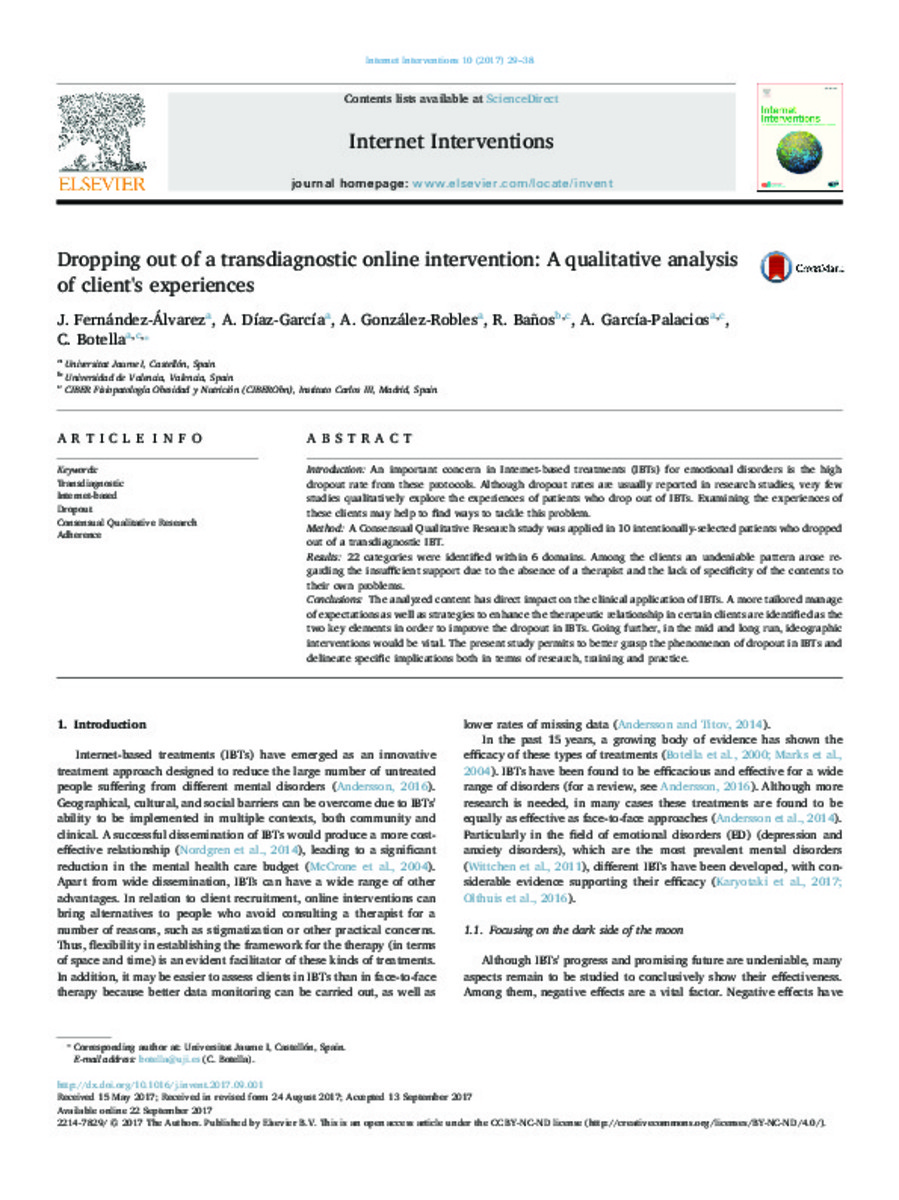Mostrar el registro sencillo del ítem
Dropping out of a transdiagnostic online intervention: A qualitative analysis of client's experiences
| dc.contributor.author | Fernández-Álvarez, Javier | |
| dc.contributor.author | Díaz-García, Amanda | |
| dc.contributor.author | González-Robles, Alberto | |
| dc.contributor.author | Baños, Rosa Maria | |
| dc.contributor.author | Díaz-García, Amanda | |
| dc.contributor.author | Botella, Cristina | |
| dc.date.accessioned | 2018-03-02T12:34:42Z | |
| dc.date.available | 2018-03-02T12:34:42Z | |
| dc.date.issued | 2017-12 | |
| dc.identifier.citation | FERNÁNDEZ-ÁLVAREZ, J., et al. Dropping out of a transdiagnostic online intervention: A qualitative analysis of client's experiences. Internet Interventions, 2017, vol. 10, p. 29-38. | ca_CA |
| dc.identifier.uri | http://hdl.handle.net/10234/173153 | |
| dc.description.abstract | Introduction An important concern in Internet-based treatments (IBTs) for emotional disorders is the high dropout rate from these protocols. Although dropout rates are usually reported in research studies, very few studies qualitatively explore the experiences of patients who drop out of IBTs. Examining the experiences of these clients may help to find ways to tackle this problem. Method A Consensual Qualitative Research study was applied in 10 intentionally-selected patients who dropped out of a transdiagnostic IBT. Results 22 categories were identified within 6 domains. Among the clients an undeniable pattern arose regarding the insufficient support due to the absence of a therapist and the lack of specificity of the contents to their own problems. Conclusions The analyzed content has direct impact on the clinical application of IBTs. A more tailored manage of expectations as well as strategies to enhance the therapeutic relationship in certain clients are identified as the two key elements in order to improve the dropout in IBTs. Going further, in the mid and long run, ideographic interventions would be vital. The present study permits to better grasp the phenomenon of dropout in IBTs and delineate specific implications both in terms of research, training and practice. | ca_CA |
| dc.format.extent | 9 p. | ca_CA |
| dc.format.mimetype | application/pdf | ca_CA |
| dc.language.iso | eng | ca_CA |
| dc.publisher | Elsevier | ca_CA |
| dc.rights | © 2017 The Authors. Published by Elsevier B.V. | ca_CA |
| dc.rights | Attribution-NonCommercial-NoDerivatives 4.0 Internacional | * |
| dc.rights.uri | http://creativecommons.org/licenses/by-nc-nd/4.0/ | * |
| dc.subject | transdiagnostic | ca_CA |
| dc.subject | Internet-based | ca_CA |
| dc.subject | dropout | ca_CA |
| dc.subject | consensual qualitative research | ca_CA |
| dc.subject | adherence | ca_CA |
| dc.title | Dropping out of a transdiagnostic online intervention: A qualitative analysis of client's experiences | ca_CA |
| dc.type | info:eu-repo/semantics/article | ca_CA |
| dc.identifier.doi | https://doi.org/10.1016/j.invent.2017.09.001 | |
| dc.relation.projectID | CIBER Fisiopatología de la Obesidad y Nutrición-ISCIII (CB06/03/0052) ; Red de Excelencia (PSI2014-56303-REDT) PROMOSAM: Research in processes, mechanisms and psychological treatments for mental health promotion, Ministry of Economy and Competitiveness (2014); PhD grant from the Ministry of Economy and Competitiveness (BES-2015-072360); PhD grant from the Ministry of Education, Culture and Sports, Spain (FPU13/00576) | ca_CA |
| dc.rights.accessRights | info:eu-repo/semantics/openAccess | ca_CA |
| dc.relation.publisherVersion | https://www.sciencedirect.com/science/article/pii/S2214782917300520 | ca_CA |
| dc.type.version | info:eu-repo/semantics/publishedVersion | ca_CA |
Ficheros en el ítem
Este ítem aparece en la(s) siguiente(s) colección(ones)
-
PSB_Articles [1303]
Articles de publicacions periòdiques








